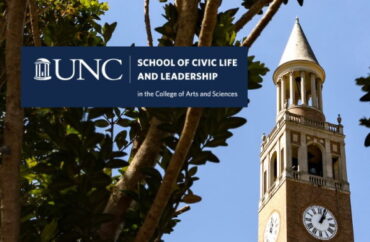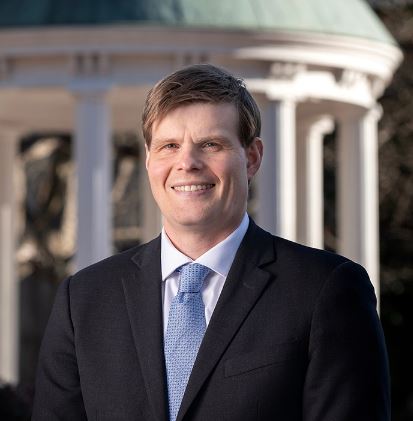
Leaders of new school respond to latest round of complaints
A newly established School of Civic Life and Leadership at the University of North Carolina Chapel Hill — launched in part to help combat cancel culture on campus — is facing another round of criticisms from some students and scholars who would like to see the program canceled.
The school began offering its first wave of classes this fall semester, prompting a new volley of pushback from some still upset the program was founded.
The latest criticisms of the school — developed over the last couple years to battle groupthink, foster civil debate for students and scholars, and allow intellectual diversity to flourish — include claims the faculty hiring process was not rigorous and its curriculum double-dips on topics already offered.
To some, the denunciations show how much the school is sorely needed on campus.
The new curriculum will provide students “a culture of liberal inquiry that helps them explore the big questions of meaning and purpose, develop their capacities for civil discourse and wise decision making … and ultimately to engage charitably with coworkers and neighbors with different backgrounds and viewpoints,” said Dean Jed Atkins in an interview with The College Fix.
UNC Chapel Hill is the flagship university in a purple state with a socioeconomic diverse body that represents the full range of the country’s political and moral views, he said.
Yet research conducted by The College Fix shows many humanities departments at the institution do not employ a single Republican professor — a trend that spans at least the last decade.
 The program, known on campus as “SCiLL,” will foster balance and advance civility, said Atkins (pictured).
The program, known on campus as “SCiLL,” will foster balance and advance civility, said Atkins (pictured).
“Imagine having thousands of students every year that graduate from Carolina … who are able to make good decisions … to have conversations across difference, and imagine what that would be like in 40 years — what the state would be like, what the country would be like, what the world would be like,” he said.
“After 40 years we would have a really incredible citizenry. I think supporting that vision is a wonderful use of the state’s money.”
Criticisms continue
During its founding stages, almost 700 faculty signed a petition arguing the school was a waste of state funds that could be better used elsewhere.
“This initiative, reflecting BOT [Board of Trustees] members’ proclaimed desire for greater partisan balance among the professoriate, came from BOT members rather than faculty, and it comes with $4 million in state funding amid financial austerity elsewhere at UNC. It constitutes a clear violation of the established principle that faculty, not politicians, are responsible for a college’s curriculum,” it stated in part.
More recently, an op-ed published last month by UNC’s student newspaper from history Professor Jay Smith argued the hiring process for the school was essentially “affirmative action” for conservatives.
“Although they may be fine people and scholars, the core faculty of SCiLL, lacking departmental affiliations, escaped the rigors of normal academic hiring practices. The school to which they were recruited is unconstrained by traditions of disciplinary expertise,” Smith wrote.
“Though they would never admit it, the faculty of SCiLL benefited from affirmative action, but of the unjustifiable kind that works in reverse,” Smith added.
Smith’s critique isn’t the only one SCiLL received this semester. The editorial board of the student newspaper, the Daily Tar Heel, claimed in a Sept. 15 editorial the school unnecessarily addresses issues that don’t require an entirely new center to resolve.
“The new SCiLL program follows an already revamped general education program that was launched in 2022, the IDEAs in Action curriculum. If administration feels that their current roster of classes does not foster safe environments for discourse, then it would be a better use of money and resources to address these issues internally, rather than creating a separate school,” the editorial argued.
‘We have a set of highly qualified new colleagues’
In response to hiring criticisms, Atkins said he is proud of the way the search committee went about locating “superb faculty with wonderful credentials from top schools around the world.”
All of the 11 new faculty of the school earned their PhDs at Ivy League or other top-ranked institutions and boast leadership experience in campus projects that advanced academic inquiry and heterodox studies, according to their bios.
Among them is history Professor Danielle Charette, who earned a doctorate from the University of Chicago and formerly worked at the University of Virginia as associate director of the Program on Constitutionalism and Democracy. Also hired was history Professor Flynn Cratty, founding executive director of Harvard’s Council on Academic Freedom who received a doctorate from Yale.
Inger Brodey, an English professor at UNC who chaired the search committee, told The College Fix she is “confident that we have a set of highly qualified new colleagues.”
Having served on several search committees in the past at UNC, she noted the SCiLL committee was one of the most varied in terms of representation of academic disciplines.
“Our search committee was composed of a person from English and Comparative Literature, a person from Astronomy and Physics, a person from Communications, and a person from Asian Studies,” she said via email. “The fact that we were all able to agree on the rankings of candidates, often unanimously, was particularly impressive for this reason.”
“I would also say that in this search we kept mission front and center when selecting candidates to interview at each stage. We were also unusually focused on undergraduate teaching and mentoring abilities.”
She said candidates were also vetted by students themselves during teaching demonstrations.
“We took student feedback very seriously along with that of faculty colleagues in making the final evaluations,” Brodey said.
Professor Smith, in his op-ed critique of his new colleagues, argued their “candidacies for positions at UNC were made possible not by pure merit, which they may or may not possess, but by their membership in or adjacency to a well-funded conservative ecosystem saturated by euphemisms like ‘viewpoint diversity,’ ‘civility’ and ‘balance.’”
Smith works in the history department at UNC, which has at least 50 professors, but employs no registered Republicans, according to a review last month of online voting records published by the state. He did not respond to The College Fix’s requests for comment.
‘The best civic education for the students of North Carolina’
Though controversial, SCiLL aims to equip students with the necessary tools to have conversations about difficult or polarizing topics, Atkins said.
On tap for the school: a course on civil discourse in session this fall, and hopes for the creation of a dorm where students can focus on engaging in civil discourse outside of class, he said.
Atkins also highlighted the Civic Life and Leadership minor, as well as SCiLL’s visiting scholars program, which brings renowned speakers to campus.
“It’s really important to be able to return to the big questions of meaning, of human civic flourishing, to be able to provide our students with the capacities to have enough conversations across difference and then to be able to make wise decisions as they move out into the world,” he said. “That kind of wise decision making, being able to take on lots of different viewpoints, and also different sorts of knowledge, is crucial to leadership.”
Atkins additionally pointed out that having a school like SCiLL on campus isn’t just a resource for students, but it’s also a place for faculty to learn how to have difficult conversations and learn to talk to others who might disagree with them.
“There’s a great desire for students to have this work, and there’s a great desire for faculty because for both students and faculty there’s a perception—and I think it’s a true one—that having conversations across difference is hard, it’s not something we naturally do, and we don’t have the luxury of continuing to assume that these kind of conversations and the capacities for them will happen automatically,” Atkins said.
MORE: Zero Republican professors found in six humanities departments at UNC Chapel Hill
IMAGES: School of Civic Life and Leadership / UNC Chapel Hill
Like The College Fix on Facebook / Follow us on Twitter






Please join the conversation about our stories on Facebook, Twitter, Instagram, Reddit, MeWe, Rumble, Gab, Minds and Gettr.